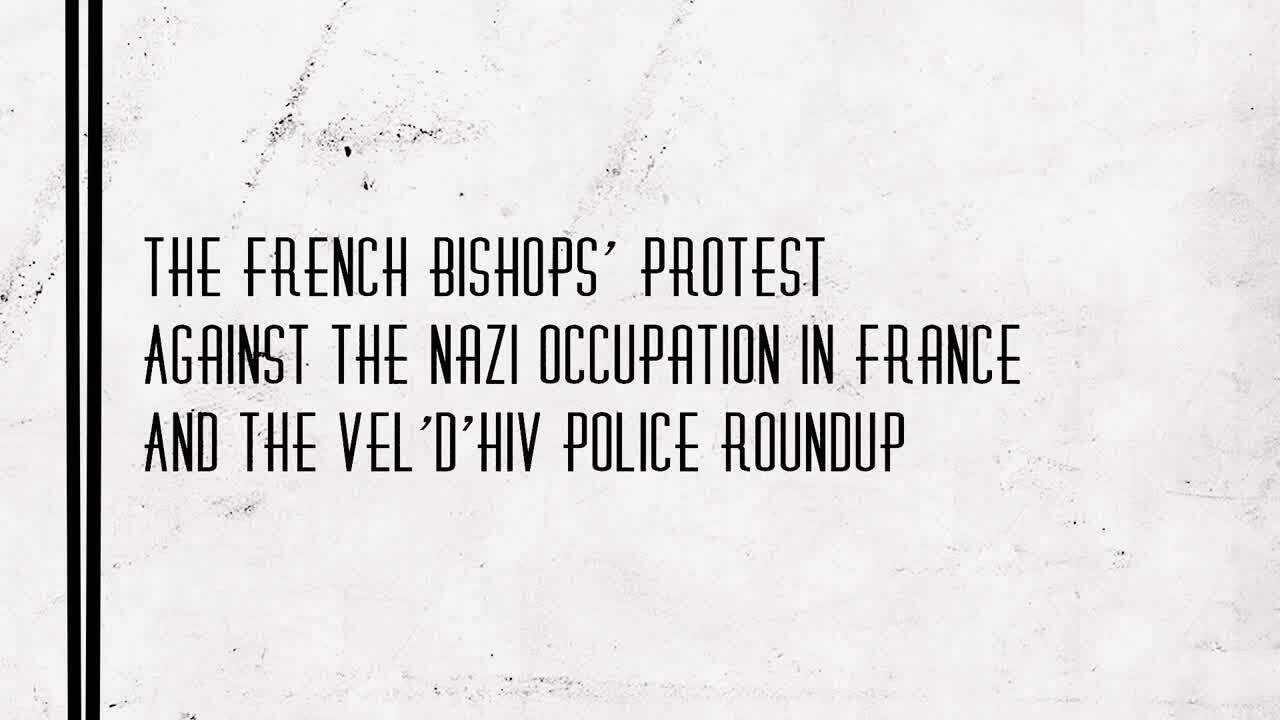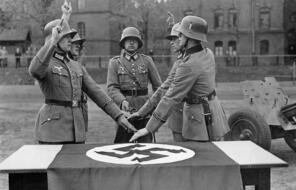Breadcrumb
Protestation des évêques français contre l’occupation nazie en France et la rafle de la police du Vel’ d’Hiv
At a Glance
- Génocide
- Histoire de la Shoah
- Droits humains, droits civiques
Protestation des évêques français contre l’occupation nazie en France et la rafle de la police du Vel’ d’Hiv

Shortly after the Nazis invaded France, the Vichy regime met and they decided that they wanted to put forth antisemitic legislation that would strip the Jews of their civil rights. And this is the first of a series of antisemitic legislation that would come to be promulgated in France and is called the Statut des Juifs.
In 1940, when the French government came to the French episcopate and they asked them to decide whether or not to support the Statut des Juifs, the French bishops decided to formally support this antisemitic legislation. In 1942, a huge subset of the Church defects from this stance and they walk up to their pulpits-- and they walked up on the same day-- and they read a letter. And that letter said, the Jews are our brothers and our sisters. The right of sanctuary should exist in our churches. It's a shame that it doesn't. We have to stand up and speak out and protect them. It is our Catholic duty and it's our moral duty to defend and protect the Jews.
And this was a total 180 from what they said two years prior. And not only protest on behalf of Jews, but call on all Catholics to mobilize to help save them.
And the question is, why? What motivated them to defect from their support for the Vichy regime and their support for antisemitic legislation and, in this case, very outright blankly protest on behalf of Jews?
One of the things I argue is really critical in motivating these bishops to defect was critical events. And this is a term in sociology, actually. Moments of crisis, moments in which the world gets turned into disarray.
It was like that when the Nazis invaded France. It was also a real crisis moment in July 1942, when about 13,000 Jews were rounded up in the streets of Paris and Marseille and Lyon and they were placed in the stadium, in the Vel' d'Hiv stadium right outside Paris for a couple of days. No food, no water, no bathrooms. And they were all deported to Auschwitz and immediately gassed upon arrival.
And this was just utterly horrifying in a way that previous roundups hadn't been, which is why I was talking about the importance of speaking up when things are smaller. Because throughout 1941, you had these small-scale roundups. You'd have 100 Jews rounded up here and deported or 300 or 200. And that was something that made people uncomfortable but not uncomfortable enough to say something.
So what I found in the archives is that, actually, throughout 1941, as more and more Jews get rounded up, you see these bishops are writing letters and they're writing letters whether it's to Pétain or to the Red Cross or to other bishops. And they're saying, I really am not comfortable with this. This is bad what's happening. This is bad what's happening to Jews. We should do something. We're against this.
But they didn't publicly protest until this real crisis where 13,000 Jews were rounded up. And it was like a trigger point where they felt like, if we don't say something now, then when are we going to say something?
The other thing they argue is really crucial is social capital. Your networks are really, really important. And that network can be within your group, within your organization, or outside of it. And I found it matters both ways so that the bishops who defected in support of Jews and protested on behalf of Jews, they didn't do it alone. They didn't wake up one day and say, I'm going to protest. Because they knew that doing that would put their lives at risk. So there was this process of trying to find allies, because there's safety in numbers.
The other thing is that the bishops who defected on behalf of Jews were bishops from the big cities. The big cities had Jewish citizens and civilians before the war. So the bishops who defected were bishops who knew Jews, who had personal relationships with them. They weren't just defecting in support of this idea of saving this other. They were defecting on behalf of people who they had intimate relationships with, who themselves had been killed.
Cardinal Gerlier is an interesting character, particularly because he was the chief spokesperson for the Church. And so much of his public declarations are how we understand the Church's position on the Vichy regime and towards the Holocaust and towards the Nazis.
There was this man, Jacques Helbronner, who was one of the presidents of the Jewish Council, or the Committee for Jews during the Holocaust. Jacques Helbronner and his wife were deported to Auschwitz and they asked Cardinal Gerlier for his help and he didn't help in enough time. But his sons were saved. And you can see in his letters to this man's sons this tremendous remorse, incredible sadness. And I felt it when I was reading the documents. And there's two things happening. First of all you have letter after letter after letter from Jacques Helbronner saying, this is what's happening. Please do something. Please do something.
And Gerlier is writing a couple of letters, a couple of protests, but he's not speaking out publicly. And then Helbronner gets deported to Auschwitz. And then we find out he gets killed there along with his wife. And so, first of all, his letters stop. Even in the archives, I can feel that because I have letter after letter, and suddenly no more letters from this man because he's gone. He's lost. And that was a very emotional day for me because I didn't know that that was coming, so you feel that loss. Second of all, you feel it through the bishop's letters to his son saying, I am so sorry.
So when the bishops defected on behalf of Jews, I think that was a very powerful additional motivating force because of his inability to speak up beforehand or at least speak up in a way that would be effective. Recognizing that he actually did have a significant amount of power at the time, I think, was something that he felt remorseful for. And I think it really shaped his motivation to try and save Jews afterwards.
Protestation des évêques français contre l’occupation nazie en France et la rafle de la police du Vel’ d’Hiv
You might also be interested in…
Americans and the Holocaust: The Refugee Crisis

Teaching the Holocaust and Armenian Genocide: For California Educators

Introducing and Dissecting the Writing Prompt

Introducing Evidence Logs

Adding to Evidence Logs, 1 of 4

Adding to Evidence Logs, 2 of 4

Adding to Evidence Logs, 3 of 4

Adding to Evidence Logs, 4 of 4

Refining the Thesis and Finalizing Evidence Logs

Teaching Holocaust and Human Behaviour (UK)

Do You Take the Oath?

Resources for Civic Education in California




